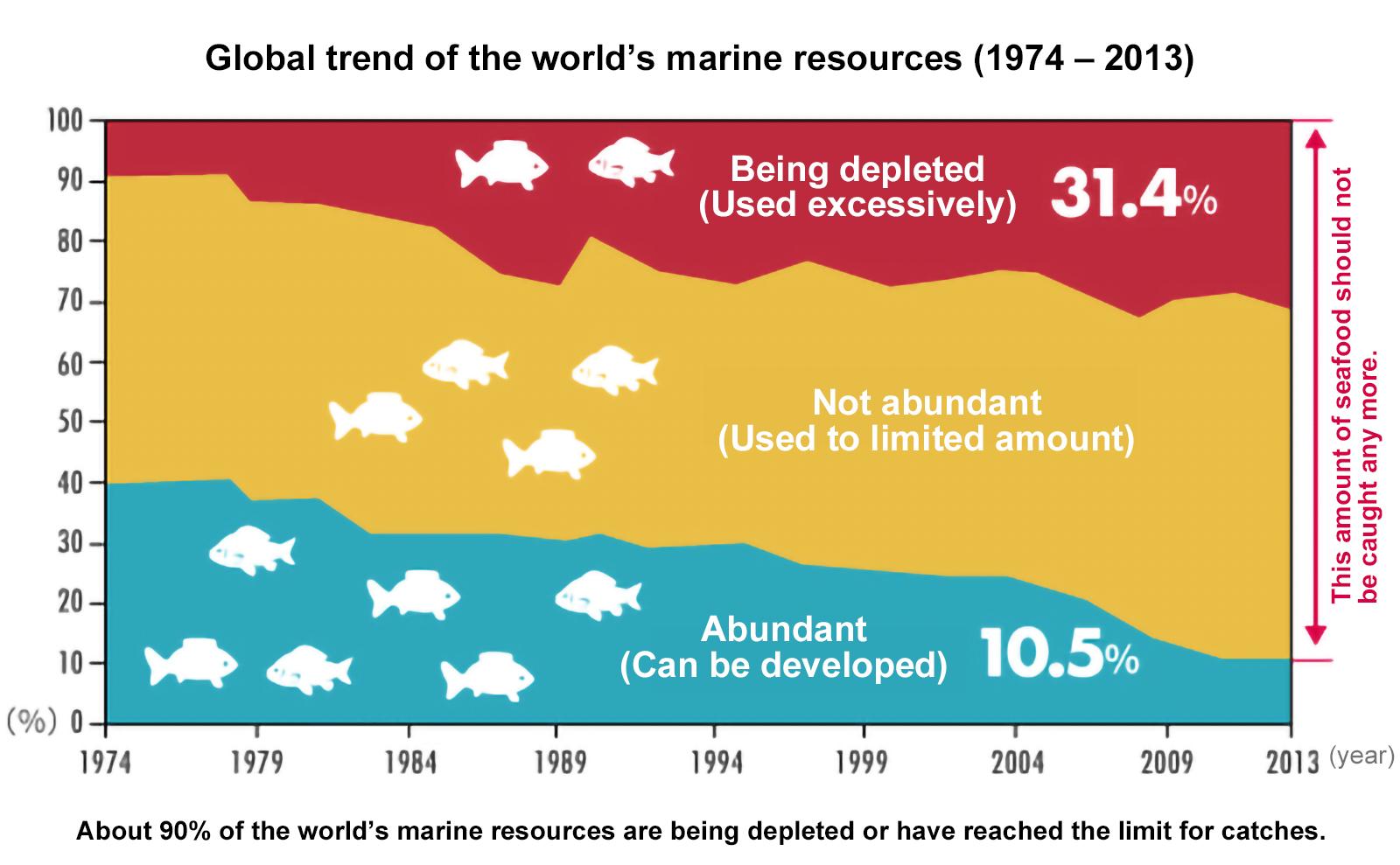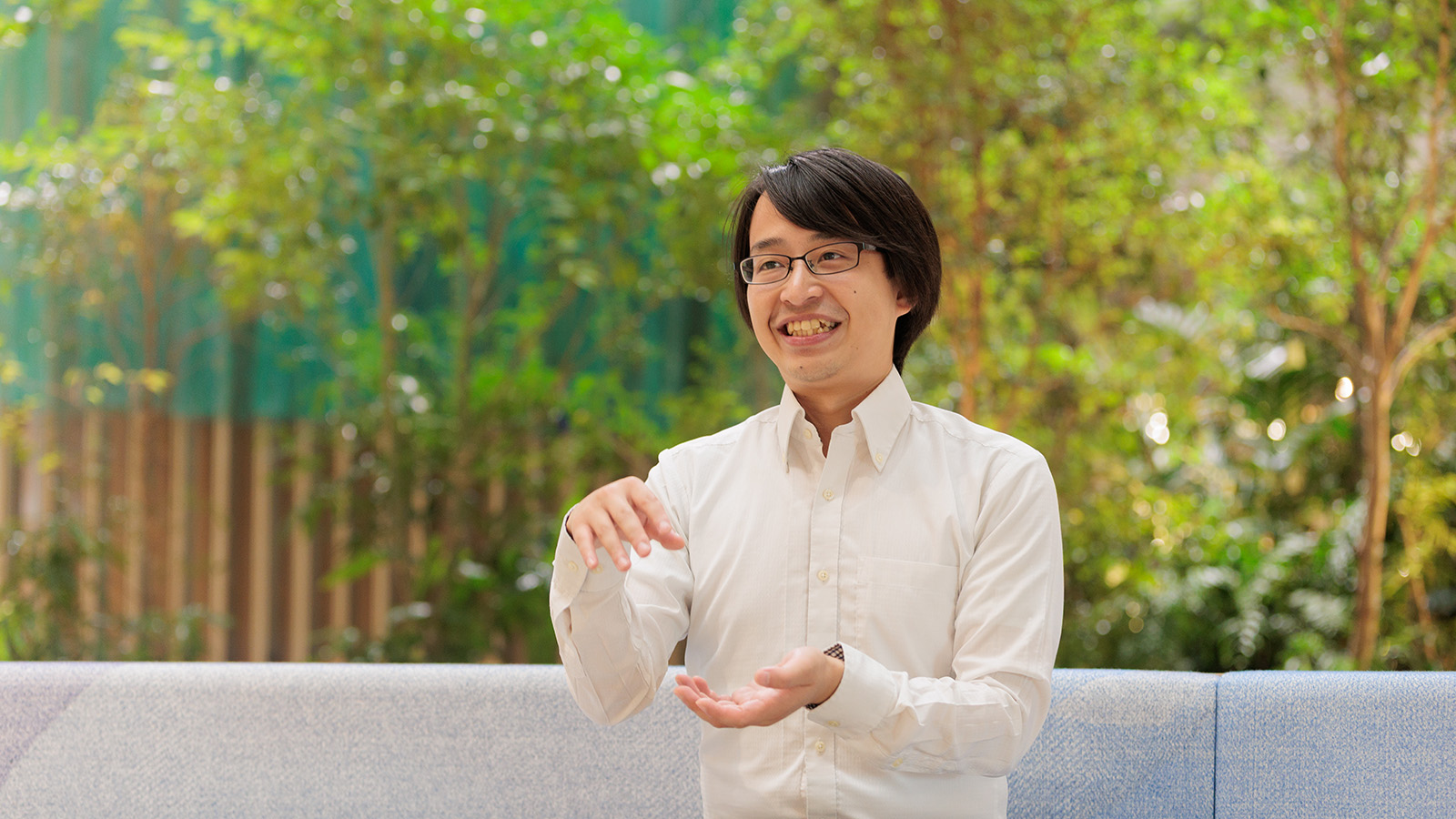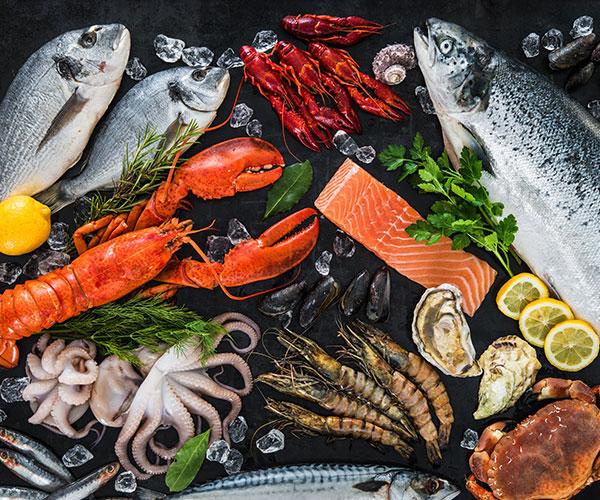
The world's marine resources are in a critical state. Desiring to conserve marine resources for the children of the future and energize the sustainable seafood movement, Panasonic became the first Japanese company to regularly serve sustainable seafood at its cafeterias. With support from food service providers, Panasonic solved various issues as a pioneer and realized an easy-to-start environment for other companies. Featured below, this initiative of Panasonic's should contribute to the effort to achieve the United Nations' SDGs (Sustainable Development Goals) and establish a legacy that lasts beyond the Olympic and Paralympic Games Tokyo 2020.
Summary of this article:
- In response to the critical situation of the world's marine resources, Panasonic became the first corporation in Japan to regularly serve sustainable seafood at its employee cafeterias.
- Through this initiative, Panasonic desires to achieve SDGs and establish a legacy that lasts beyond the Olympic and Paralympic Games Tokyo 2020.
- With cooperation from the General Affairs Department, interesting sustainable seafood items of low price were added to menus and have become popular choices of 30% of the users at the head office's cafeteria.
- Panasonic has created an environment for other companies to introduce sustainable seafood by overcoming the difficulties posed by certification being required for the whole process, from production to distribution. It aims to spread this initiative to change consumer behavior.
Contribution to achieving SDGs and establishing a legacy that lasts beyond Tokyo 2020
Sustainable seafood is seafood that is caught or farmed by eco-friendly methods that minimize damage to the sea's ecosystems and avoid overfishing. At its cafeterias, Panasonic serves seafood prepared from wild-caught marine products with MSC (Marine Stewardship Council) certification and farm-raised marine products with ASC (Aquaculture Stewardship Council) certification. Both are international certifications for sustainable seafood that certify the contribution to marine conservation based on the results of strict audits.
Panasonic started serving sustainable seafood in March 2018. At that time, "Sustainable Seafood" was served once a month at its head office cafeteria (Kadoma City, Osaka) as a menu special. At present, it is served in the cafeterias at twenty domestic bases and about 20,000 servings were provided last year alone. Panasonic is planning to serve sustainable seafood at cafeterias of about 100 domestic bases in 2020.
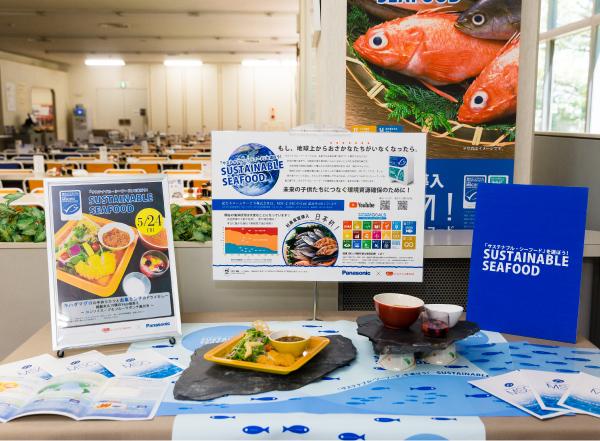
"Sustainable Seafood" special provided at the employee cafeteria
Panasonic's Mr. Kosuke Kino, who is advancing this front runner initiative, says, "This is just the beginning of our serving sustainable seafood in our cafeterias. We have about 100,000 employees in Japan and they are consumers as well. We want them to know the importance of sustainable seafood and the MSC and ASC certifications through their use of the cafeterias so that they are more aware and choose certified seafood also outside the company such as at supermarkets. We think it may lead to a change in consumer behavior. We want to introduce our activity to other companies in order to jointly promote the movement and realize SDGs and a sustainable society."
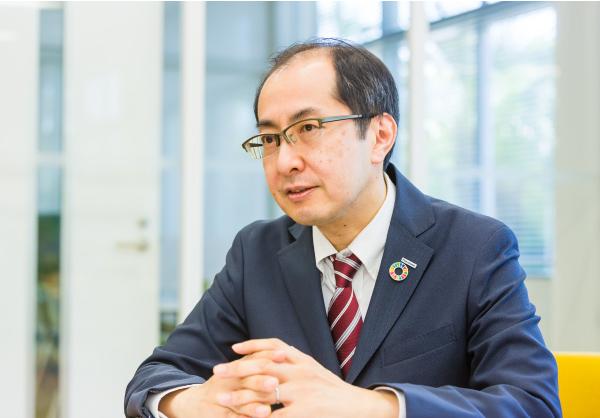
Kosuke Kino
Manager, Program Management Section, CSR & Citizenship Department, Groupwide Brand Communication Division, Panasonic Corporation
According to the FAO (Food and Agriculture Organization), about 90% of the world's marine resources are being depleted or have reached the limit for catches. Behind this is an increase in seafood consumption driven by population growth, overfishing without consideration of ecosystems, etc. In response to the critical situation, MSC and ASC certifications are spreading worldwide and 370 MSC certifications have been awarded around the world. What this means is that 15% of the wild-caught marine products are certified catches.
On the other hand, in Japan, only six fisheries including one scalloper (Hokkaido) have been awarded MSC certification and only 60 farms have been awarded ASC certification (both figures are as of the end of May 2019). Although the quantity of MSC-certified and ASC-certified seafood is increasing at major supermarkets such as Aeon, most consumers have not paid attention to the certifications.
Panasonic started this initiative because the oyster farming industry in Minamisanriku that Panasonic was supporting as a part of its CSR activities obtained the first ASC certification in Japan. As Panasonic had been conducting activities to "conserve marine resources" in cooperation with the WWF Japan for about 20 years, it inspired the people in Panasonic to support the industry not only directly but by eating the produced oysters as consumers.
Mr. Kino says, "There is also a global background to our sustainable seafood initiative. Companies are strongly demanded to contribute to SDGs, the 14th of which is to 'conserve and sustainably use the oceans, seas and marine resources.' In addition, sustainable seafood will be required at the sites and the athletes' villages of the Olympic and Paralympic Games Tokyo 2020. Panasonic has been an Official Worldwide Olympic Partner for 30 years and this initiative can be helpful towards establishing and passing on a legacy that would last beyond the Tokyo 2020 Games. Panasonic celebrated its 100th anniversary in 2018 and concurrently supports the initiative. It was very helpful for us that the initiative was viewed as an opportunity for Panasonic's employees to easily participate in its CSR activities and we could get cooperation from the General Affairs Department."
After the London Games in 2012 when MSC-certified sustainable seafood was served for the first time at the Olympic Games, the relevant movement spread all over the UK and now sustainable seafood is being served in one-third of the public facilities and schools. A demand for 200 million servings annually has been produced and is called the largest legacy of the London 2012 Games.
Japan is surrounded by sea and its per-capita consumption of marine products is the third highest among major countries (according to the FAO, Eurostat and Eumofa in 2013). "Therefore, we want to spread sustainable seafood as a general food and to pass down the culture of eating fish to children of the future," Mr. Kino said firmly.
Expanding awareness with attractive, tasty and healthy menus
After serving sustainable seafood for more than a year, the cafeteria at the head office started serving sustainable seafood side menus three times a week in addition to the monthly menu special. Awareness of sustainable seafood is high now among the employees. It is commonly called "Sus Sea" and, on the days when sustainable seafood is served, we can hear the employees talking about "Sus Sea" here and there, like "Today is the Sus-Sea day" or "What is on today's Sus-Sea menu?" In the cafeterias, menu items chosen by 20% of the users are usually thought of as popular dishes. However, the sustainable seafood special is chosen by more than 30% of the users every time it is served and sometimes by nearly 50%.
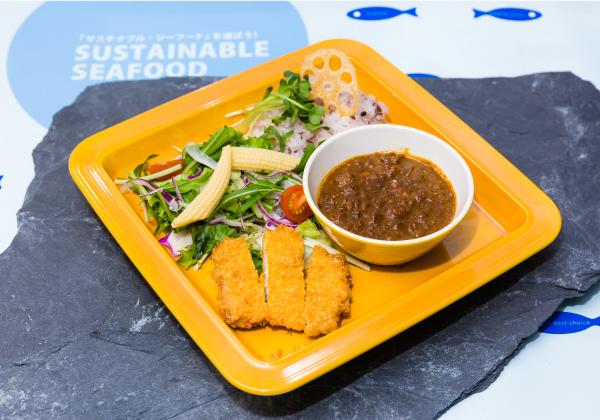
Has become popular as a menu special referred to as "Sus Sea"
Fish was originally not so popular and the high demand percentages could not have been achieved without efforts to develop interesting menu items and keep the prices down.
Panasonic's Ms. Mayumi Maekawa, who plans the menu together with the food service providers, says, "Although the employees know that the MSC-certified fish is a little expensive but environmentally friendly, they do not choose it unless it is tasty, healthy, and looks good. Every time, we plan out the menu with the food service providers to make it interesting and keep the price down."
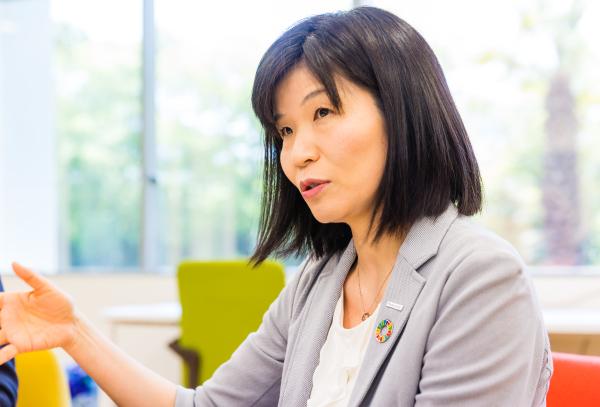
Mayumi Maekawa
Assistant Chief, General Affairs Section, Head Office Group Human Resources and General Affairs Center, Panasonic Corporation
The sustainable seafood item on the day of our interview was a "yellowfin tuna cutlet served with minced fish dry curry, rice with mixed grains, salad of ten vegetables, consommé soup and fruit punch". Ms. Maekawa was confident to serve this dish after two cooking trials and three discussions to prepare it. In order to balance out the cost, the yellowfin tuna cutlet was reduced in size and the reduction was supplemented with minced fish dry curry. The item looked healthy because of the rice with mixed grains and colorful vegetable salad, and was eye-catching because several plates were used.
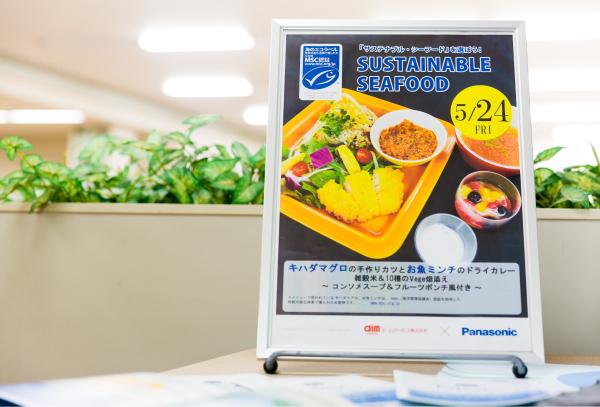
Yellowfin tuna cutlet served with minced fish dry curry, rice with mixed grains, salad of ten vegetables, consommé soup and fruit punch
In addition to promoting the sustainable seafood using posters, etc., the General Affairs Department upgraded the tableware to something is likely found in a stylish café. Although the types of fish are limited due to distribution circumstances, various measures are taken under the slogan of "tasty and healthy Sus Sea" in order to maintain the employees' interests and make the menu interesting such as by combining the seafood with popular foods like curry, adding scallops and shrimp to cold soba in the summer season, providing ethnic cuisine to add a different touch, etc. Those efforts have kept the sustainable seafood popular.
Ms. Maekawa says, "For the employees to choose MSC-certified fish at supermarkets, they have to like the taste when they eat 'Sus Sea' at the cafeterias. Since the food service providers are committed, I want as many employees as possible to eat the 'Sus Sea' item on the menu. Leftovers are not environmentally friendly, so I am excited about this initiative. As a delicious 'Sus Sea' item is provided every time, there are employees who look forward to getting the 'Sus Sea' special. Because the employees can easily participate in the company's CSR activities by just choosing a specific item on the cafeteria menu, the initiative is making the employees happy and proud of their company for proactively conducting this CSR activity."
In order to spread the menu-planning know-how for encouraging people to take an interest in and eat sustainable seafood, Ms. Maekawa is going to create a network connecting the human resources and general affairs divisions of all bases in Japan.
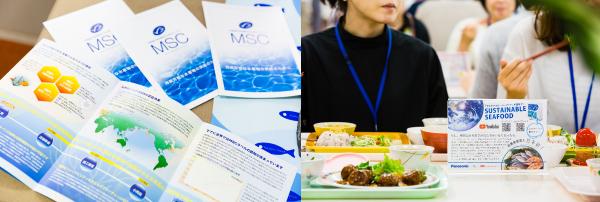
Leaflets available at the cafeteria and panels on the tables describing "Sustainable Seafood"
Overcoming difficulties in obtaining all process certifications
With regards to serving sustainable seafood, there was an issue that was more difficult than planning the menus: getting not only the food service providers but all of the processes including importers, wholesalers, food processors and distributors to obtain CoC certification for separating and appropriately managing the certified seafood.
In response to Panasonic's request, AIM SERVICES was the first food service provider to obtain CoC certification. Looking back at the difficulties his company was first to clear, Mr. Masato Yoshioka of AIM SERVICES said, "We did not know that it would be so difficult. After we started pursuing the certification, there were many issues that had to be addressed such as establishing an operation system, securing the logistics of CoC certification, a very small number of fish types that can be used for cafeterias, menu planning, pricing, etc."
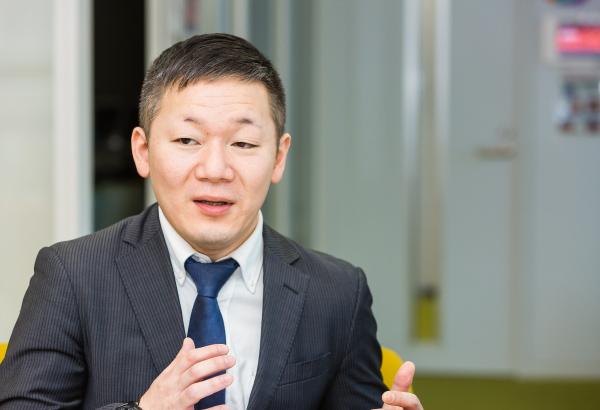
Masato Yoshioka
Chief, Environment Management Department, Quality Control Center, AIM SERVICES CO., LTD.
For example, deep-fried oysters produced in Minamisanriku were served in the cafeteria for the first time in March this year. This became possible because the factory that processed the oysters for deep frying finally obtained CoC certification. Mr. Yoshioka explained that there were difficulties in securing purchase routes. Even if a business partner is handling the certified fish, AIM SERVICES has to wait for the next catch when the partner only has enough stock for volume-retailers and does not have stock for commercial customers because it has not done this kind of transactions before.
Since commercial products are not available, it is necessary to unpack a large amount of consumer products that are individually packed. As hundreds of people come to the cafeteria at the same time, some dishes need to be prepared in advance. However, raw food requires temperature control, some dishes require additional arrangements, some dishes do not allow stacking, etc. The worksite frequently requires taking measures flexibly and AIM SERVICES has solved the issues one after another.
Mr. Yoshioka says, "Recently, I see more and more business partners who plan stock for commercial customers and allow transactions of small lot. I have realized that CoC certification is spreading and demands from other companies are increasing. But, our lineup of suppliers is also expanding. Although only six or seven types of fish were available at the beginning, the number of types has increased to twelve."
AIM SERVICES had a lot of experience in supplying food to global sport events and had been interested in sustainable seafood that was served at past events. However, compared with "tasty" and "safe", "sustainability" seemed to be a less attractive quality to customers.
Mr. Yoshioka says, "Nevertheless, when Panasonic approached us this time, we strongly desired to take part in their initiative. We believe it's a mission of a food service provider to choose sustainable seafood and protect the marine resources for the next generations. We hope we can respond also to the demands from other customers such as assisted-living facilities, hospitals, etc. in the future while working on initiatives in collaboration with Panasonic."
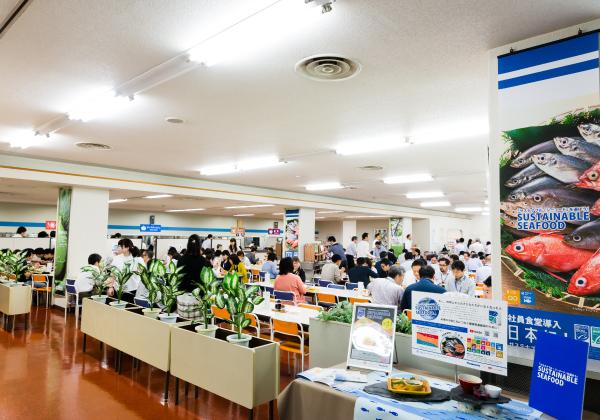
Cafeteria (Panasonic Head Office) serving sustainable seafood
Aiming at spreading not only to other companies but to local public organizations, assisted-living facilities, etc.
Panasonic proposed to also acquire certification to food service providers other than AIM SERVICES. At present, seven major companies such as Seiyo Food-Compass Group, Green House Group and Uokuni Food Services have obtained certification. Owing to this, sustainable seafood can be easily served also at cafeterias of other companies; service started at the cafeterias of Sompo Japan Nipponkoa Insurance, DENSO, and JXTG Holdings. Serving sustainable seafood is spreading among the corporate world.
If it spreads also to local governments, public facilities, hospitals, assisted-living facilities, school lunches, restaurants, etc., demands will increase and promote producers' activities. Then, a sustainable society will eventually be realized. Panasonic's initiative is challenging social reform with a far-reaching perspective.
Spreading "Sustainable Seafood" may also save Japan's declining fishery industry. Mr. Kino says, "When the oyster fisheries were rebuilt in Minamisanriku after they were lost in the Great East Japan Earthquake, facilities were scaled down to one-third of that before and that led to the acquisition of ASC certification. It not only brought about a sustainable environment but accelerated oyster growth three-fold. Quality subsequently improved and prices increased. In addition, working hours were reduced since production was scaled down and the young people engaged in the oyster farming increased. This is a very good example of balanced social and economic values. Since EXPO 2025 will be held in Osaka, we would like to keep the momentum going and continue to spread "Sustainable Seafood" beyond the Tokyo 2020 Games."
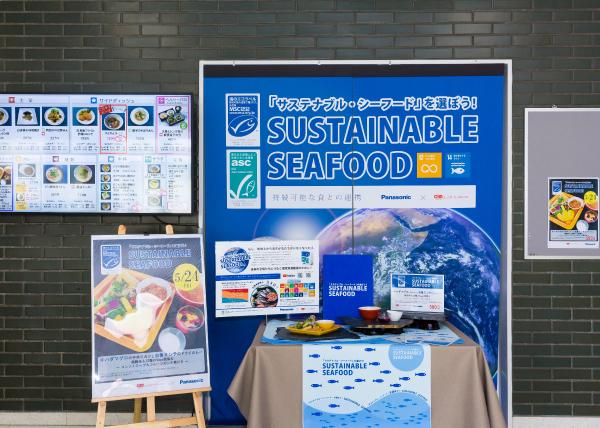
Special display placed in front of the cafeteria to spur interests in sustainable seafood
- Reproduced from the website "Mirai-kotohajime," by courtesy of Nikkei Business Publications, Inc.
# # #
- Disclaimer:
- We would like to note that Panasonic Newsroom is not a place to address personal Customer Service issues. Even though this is not the forum, Panasonic is always eager to resolve your concerns. Our local customer services contacts can be found at Global Support or you can see our list of Social Media Accounts to find the right channel for your queries and concerns.

